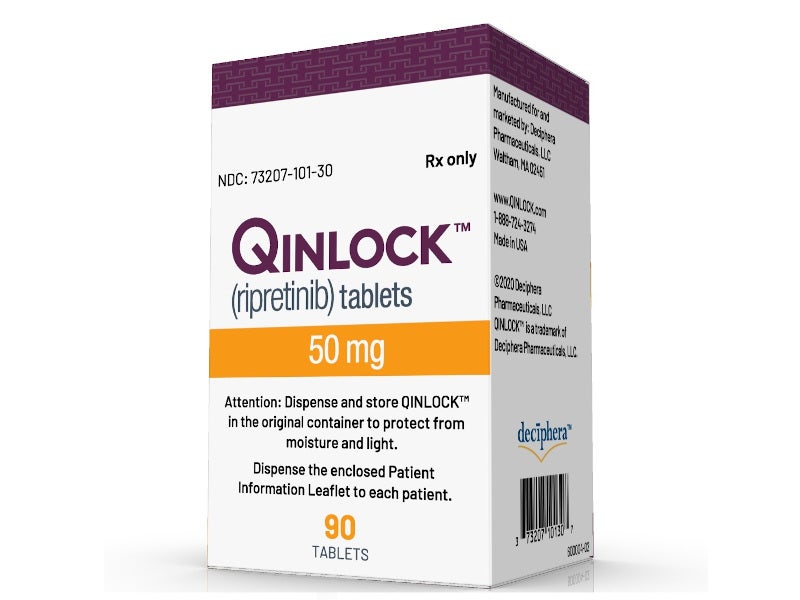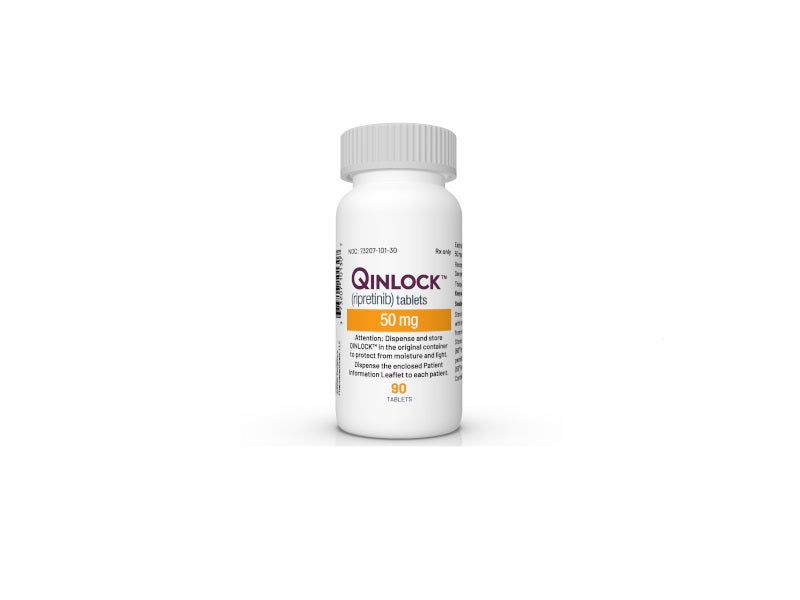QINLOCK™ (ripretinib) is indicated as a fourth-line treatment for advanced gastrointestinal stromal tumour (GIST) in adult patients who have completed previous treatment with three or more kinase inhibitors, including imatinib.
Developed by Deciphera Pharmaceuticals, the new drug application (NDA) for the drug was submitted to the US Food and Drug Administration (FDA) in December 2019. The NDA was accepted for review by the FDA in February 2020, while the FDA also granted fast track, breakthrough therapy and orphan drug designation to the application to expedite the review process.
The QINLOCK NDA is a part of Project Orbis, a programme by the FDA Oncology Center of Excellence that helps in the concurrent submission and review of oncology drugs. The FDA partnered with the Australian Therapeutic Goods Administration (TGA) and Health Canada to review the NDA as part of the project.
The FDA approved the drug in May 2020 three months ahead of the scheduled Prescription Drug User Fee Act (PDUFA) date of 13 August 2020. Australian TGA and Health Canada are currently reviewing the NDA applications.
QINLOCK is available in the form of oral tablets with a recommended dose of 150mg once daily with or without food. Deciphera has appointed AmerisourceBergen for the distribution and unified marketing of the drug in the US.
Gastrointestinal Stromal Tumour (GIST) causes and symptoms
A gastrointestinal stromal tumour is a type of tumour that arises in the gastrointestinal tract, stomach or small intestine, formed due to the development of specialised cells in the gastrointestinal tract called interstitial cells. These cells tumours can be either be malignant (cancerous) or benign (not cancerous).
Most cases of GIST are caused by a variety of mutations. The most common mutations occur in proto-oncogene c-KIT (KIT) kinase, which accounts for approximately 80% of cases, or in platelet-derived growth factor receptor α (PDGFRα) kinase, constituting approximately 10% of cases.
Symptoms of GIST include loss of appetite, weight loss, low red blood cell counts (anaemia), weakness, tiredness, pain or swelling in the abdomen, vomiting, nausea, black and tarry stools and vomiting of blood.
QINLOCK mechanism of action
QINLOCK is a tyrosine kinase inhibitor, which works by blocking KIT kinase and PDGFRα kinase including wild type, primary and secondary mutations. The drug attacks a broad spectrum of KIT and PDGFRα mutations that activate GIST.
Ripretinib also inhibits additional in vitro kinases such as platelet-derived growth factor receptor-beta (PDGFRB), Tunica interna endothelial 2 (TIE2), vascular endothelial growth factor 2 (VEGFR2), and B-Raf Proto-Oncogene (BRAF).
Clinical trials on QINLOCK
FDA approval of QINLOCK was based on the INVICTUS study, a phase three randomised, international, multi-centre, double-blind, placebo-controlled clinical trial.
The INVICTUS trial tested the efficacy of QINLOCK in 129 advanced GIST patients previously treated with other FDA-approved targeted drugs including imatinib, sunitinib and regorafenib.
Patients were randomised 2:1 to receive either QINLOCK (n=85) 150mg or placebo (n=44) orally once a day until disease progression or unacceptable toxicity. Tumour response tests were performed every 28 days for the first four months and then every 56 days thereafter.
The primary endpoint of the study was progression-free survival (PFS) based on a blinded independent central review (BICR) using modified Response Evaluation Criteria in Solid Tumours (RECIST) v1.1.
The secondary endpoints as determined by the independent radiological review using the modified RECIST included objective response rate (ORR) and overall survival rate (OS).
The average PFS in the study was 6.3 months for the patients who received QINLOCK compared to one month in the placebo arm. QINLOCK also reduced the risk of disease progression or death by 85%.
QINLOCK showed a 9% ORR compared to 0% for placebo and a median OS of 15.1 months in the placebo arm compared to 6.6 months. The drug also lowered the probability of mortality by 64%.
The most common side effects associated with QINLOCK in the clinical trial were vomiting, nausea, alopecia (hair loss), abdominal pain, fatigue, decreased appetite, myalgia (muscle pain), constipation, diarrhoea and palmar-plantar erythrodysesthesia syndrome (a skin reaction in the palms and soles).





